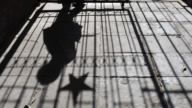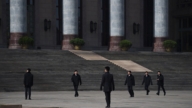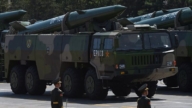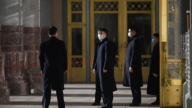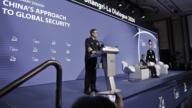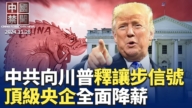【新唐人2012年12月29日訊】湖南省委書記周強日前在一場會議上,當著近千名幹部說,「部分官員拿好處不辦事,屁股一拍就走人。」他要求一定要嚴懲害群之馬。不過學者指出,這種「運動式的反腐」,不可能解決根本問題,權力的分權和制衡才是根本的解決之道。
在12月25號的湖南省委經濟工作會議上,省委書記周強說:有的把企業當成「唐僧肉」,隨意向企業伸手,索拿卡要,甚至敲詐勒索……
講到這裡,周強甚至激憤的說:「有些部門、有些幹部過去是要有好處才辦事,現在就是拿了好處也不辦事,喝完了酒,吃完了飯,泡完了腳,屁股一拍就走人,甚麼事也不辦,甚麼問題也不幫企業解決!」「還有,一些部門靠檢查評比索拿卡要,這個問題已經很嚴重甚至十分嚴重。」
上海商人謝丹:「所有人都會覺得,如果自己不貪、不貪慾,自己就虧了。因為自己好不容易坐到這個位置,費盡周折、費九牛二虎之力,甚至他的官位本身就是花錢去買來的,跑官跑來的。」
經常與政府部門打交道的謝丹表示,現在腐敗已經滲透到了所有領域,所有官員都是有恃無恐,吃、喝、拿、要,手法翻新無以復加,也越來越隱秘。
舉例說,謝丹去政府部門辦事,被領到指定的飯店吃飯,可價格要比外邊的貴出近2倍。謝丹以他商人的眼光指出:「這裡一定有貓膩。」
外界認為,周強的發火,可能與「三一集團」被迫遷往北京有關。「三一集團」每年的產值高達800多個億,同時也是湖南的納稅大戶。
《財訊網》指出,無論是因為傳說中遭到國有企業「中聯重科」的擠對,還是「三一」自己說的「規避惡性競爭」,都暴露了湖南經濟發展環境問題。以「三一集團」這樣的規模都懼怕「競爭」,其他無數的中小民營企業,面臨的環境之險惡就可想而知了:各種稅費佔去58%的利潤,除去日常的索拿卡要,逢年過節送紅包都送到手軟。
湖南省紀委預防腐敗辦公室副主任陸群,在實名認證的微博中透露,他曾詢問一名廣東在湖南的投資商﹕「粵湘兩地投資環境有何不同」,對方比喻﹕同樣一個項目,在廣東一次性送40萬元,可能很快就辦好。在湖南,送大額現金沒人要,請吃飯、唱歌、洗腳天天來,紅包、購物券照收不誤,幾個月過去了,40萬元花完了,可能泡都沒冒一個。
周強在會上要求:「省紀委、優化辦要公開曝光一批典型案件,嚴肅懲處害群之馬。各地也要查處一批典型案件,以儆傚尤!」
原《河北人民廣播電臺》編輯 朱欣欣:「中共黨內的反腐敗,它不是為了老百姓,它都是為了鞏固官僚體制的工作效率,對外鞏固它的統治性。這種靠運動式的反腐不可能解決根本問題的。 中共應該藉著目前反腐又一波的運動,進一步從制度的設計上,尤其在權力的分權和制衡上,要下工夫,解決根本的問題。」
「中央黨校」教授周天勇接受媒體採訪時說,90%民營企業只有偷稅漏稅才能存活。現實的社會環境,讓中國企業家撈一把走人是普遍心態。
日前發佈的《中國國際移民報告(2012)》顯示,中國個人資產超過一億元的企業主中,27%已經移民,47%在考慮移民,個人資產超過一千萬元的人群中,近60%的人士已經完成投資移民或有相關考慮。
大陸自由撰稿人朱欣欣還指出,中國一黨專制,沒有監督,缺少制衡,貪官、庸官遍地,想治理好社會成了奢望。
採訪/朱智善 編輯/宋風 後製/孫寧
Hunan Communist Officials Take Bribes for Doing Nothing in Return
Zhou Qiang, the Hunan Provincial Party Chief recently spoke
to hundreds of Chinese Communist Party (CCP) cadres.
Zhou criticized some officials who do nothing
in return, after taking bribes from enterprises.
Zhou Qiang has claimed to have severely
punished a number of implicated officials.
Commentators say that such a drive in
anti-corruption cannot truly solve core problems.
A system of checks and balances is the real solution.
On December 25, Zhou Qiang, Hunan’s Party Chief,
spoke at a provincial economic work conference.
Zhou commented that some officials
randomly ask for, or blackmail for money
from enterprises as if they were big fishes.
Reportedly, Zhou Qiang said angrily that in the past,
some officials handled affairs in return for taking money.
But now, some officials simply do nothing for enterprises,
even after having been paid or entertained by them.
Zhou also indicated that some government
departments take advantage of inspections
and assessments, in order to pocket money.
The problem has become serious and even severe.
Xie Dan, Shanghai businessman: “Every official
believes he’ll stand to lose if he is not taking bribes.
This is because it’s difficult for him to take the seat,
which may be directly bought with a lot of money.”
Businessman Xie Dan maintains frequent
contact with CCP government departments.
He reveals that corruption has now
penetrated into all areas in China.
All CCP officials have no fear about being entertained,
taking bribes and even demanding money from others.
Their tricks have become more innovative and secretive.
Xie Dan cited an example that he personally experienced.
When entertaining CCP officials in a designated
restaurant, Xie was billed for nearly twice market price.
He believed there must be illegal deals behind it.
Zhou Qiang’s anger was thought to be
related to SANY Group’s move to Beijing.
SANY is a large manufacturing
company, and large taxpayer in Hunan.
It has an annual output value of over 80 Billion yuan.
‘Caixun.com’ comments that SANY Group’s relocation
exposed problems of economic development in Hunan.
SANY reportedly claimed to be
“avoiding vicious competition”.
Commentators say that if SANY, a large-sized
business, is afraid of “competition",
it can be anticipated how bad an environment other countless
small and medium-sized private enterprises are facing.
According to the article, 58% of enterprise profits
are taken for various taxes and payment of fees.
Except for daily bribes, at festivals, enterprises have
to gift cash-filled red envelopes to CCP officials.
Lu Qun, Deputy Director of the CCP Corruption-Prevention
Office in Hunan, disclosed information within his micro-blog.
He once asked an investor from Guangdong,
“what’s the difference between Guangdong
and Hunan in terms of investment environment?”
The investor replied with a metaphor.
To get approval for the same project, in Guangdong, it
would be done for a lump-sum cash bribe of 400,000 yuan.
But in Hunan, big cash bribes don’t work.
Hunan officials accept specific entertainment
with meals, singing, foot-massages, plus red envelopes and shopping vouchers.
But nothing will be done after 400,000 yuan is spent.
Media reported that Zhou Qiang requested a number
of typical corruption cases to be exposed to the public.
Some implicated officials would be severely punished.
Reportedly, Zhou Qiang demanded to investigate similar
typical cases in other regions across Hunan, to deter others.
Zhu Xinxin, former editor of Hebei official radio station:
“The drive for anti-corruption isn’t done for ordinary people.
It is to cement the work efficiency of its
bureaucracy and the rule of the CCP.
Such an anti-corruption drive cannot
resolve the underlying problem.
The CCP should improve the political system, especially
checks and balances, to solve core problems.”
Professor Zhou Tianyong, from the CCP Central Party
School, told media that 90% of private enterprises in
China cannot sustain themselves, unless they evade tax.
This reality forces Chinese entrepreneurs
to reap profits and then disappear.
A report on Chinese International Migration (2012)
shows that among entrepreneurs with assets worth
over 100 Million RMB, 27% have emigrated.
A further 47% of them are considering emigrating abroad.
Among people with personal wealth over 10 million RMB,
nearly 60% have emigrated or have decided to emigrate.
Zhu Xinxin indicates that one-party rule has made
China lack a watchdog, with no checks and balances.
The country is filled with corrupt and incompetent officials.
He says that healthy governance in China
has now become a luxury for Chinese people.


